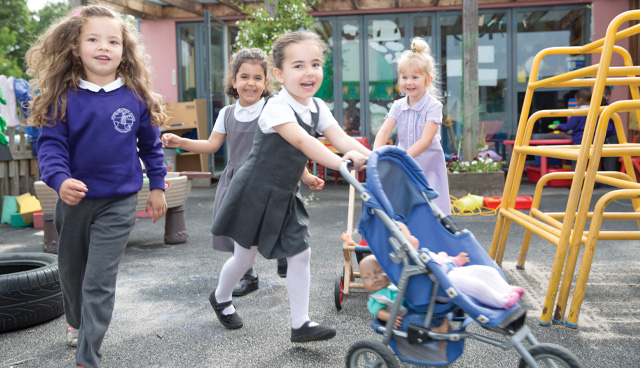Getting real about recovery

In March 2020 things changed for everyone across the UK as we entered the “delay” phase in the fight against the COVID-19 virus. We were told that “we were all in this together” but it soon became clear that the pandemic amplified inequalities and our experience was very different depending on income, ethnicity and age, writes Celine McStravick, Director of the National Children’s Bureau.
In Northern Ireland the hospital admission rate for COVID-19 in the 10 per cent most deprived areas was almost double the rate in the 10 per cent least deprived areas. Even before the onset of the crisis, 24 per cent of children were living in poverty, school budgets were under pressure, children with special educational needs faced constant challenges with an inadequate and poorly-planned support system and waiting lists for children and young people’s mental health services were unacceptably long.
All children have the right to thrive and the global pandemic has shone a light on deeply entrenched inequalities.
The pandemic has also shown us how our public services can respond quickly and with flexible solutions when required. Within the first three weeks of lockdown the Department for Communities distributed over 30,000 food parcels and, according to the Education and Training Inspectorate, a scheme to provide pupils with laptops had seen demand outstrip supply.
As we plan for recovery, this is the time to hold tight to those innovative policies that responded to identified need and reimagine what life should be like for all children in Northern Ireland irrespective of income or circumstance. Why do we aspire for a return to ‘normal’ when that ‘normal’ did not fulfil children’s rights and only served to bolster inequalities rather than addressing them?
The Government, understandably, has so far focused on the immediate health and economic consequences of Covid-19 but now we need to see real long term investment in a better future for children focussing on the following areas.
Poverty
We know that poverty holds children back in so many areas of their lives, harming health and learning and is preventing them from reaching their full potential. The Minister for Communities reported an “unprecedented demand in terms of new claims for Universal Credit” during Covid-19 lockdown, so child poverty will increase further. The Education Minister’s decision for payments to be made directly to families where children were eligible for free school meals was welcome, but this is piecemeal and we need a strategic long-term approach to alleviate the effects of child poverty. The child poverty strategy needs to be re-energised and implemented immediately.
Education and inequalities
Some schools have remained open throughout the pandemic for vulnerable children, but only about 1 per cent of those places were taken up. The online world became the classroom for the majority of children who had access to laptops. Other children had to share resources or cope without any while the digital divide grew.
When schools reopen we must plan from the outset how to reclaim an education system that supports the long term wellbeing of every child. Children thrive when they are safe and supported and teachers have told us that they want to develop trauma informed and responsive environments for children; that’s the priority and any talk of catching up is adding pressure. It’s now time to develop and implement a wellbeing framework for schools and a long-term solution to our unequal education system. Children and parents and carers should inform that solution, for this is about more than bricks and mortar, it’s about focusing on what we value most and building better long-term outcomes for children.
Long-term ambition for education, employment and training
In 2020 some of our young people will be leaving school seeking employment in a particularly challenging economic climate. The economic damage of the Covid-19 crisis could hit young workers hardest, with some researchers predicting a spike in youth unemployment from 8 per cent to 26 per cent in Autumn 2020. We need to see a commitment to supporting these young people, providing guaranteed jobs and training.
Mental health and wellbeing
Childhood emotional wellbeing is the number one predictor of adult life satisfaction. If we want happy, satisfied adults then we need to have children who are emotionally well. We don’t know what long-term impact Covid-19 will have on children. We do know that some children may have enjoyed the break from peers and school, some will have struggled, and many have been at risk of abuse or neglect in homes where families were already finding it hard to cope before the pandemic. We should acknowledge these different experiences and invest in strategic and accessible mental health support for children, allowing them to express their fears, anxieties and memories of this unprecedented time.
Why do we aspire for a return to ‘normal’ when that ‘normal’ did not fulfil children’s rights and only served to bolster inequalities rather than addressing them?
We should also prioritise improving our understanding of how children’s wellbeing and mental health has been affected. Specialists in psychology, mental health and neuroscience have highlighted the mental health risk of lockdown to school children. Over 5,000 new babies were born during lockdown and our analysis of research and policy relating to the mental health of under-fives predicts that Covid-19 is likely to increase the strain on babies, infants and their parents, and that now is the moment to make their emotional wellbeing a priority. The Northern Ireland mental health action plan is only a first step: we need to see the 10-year mental health strategy developed in earnest with long-term investment in this area.
The online world
We know that children and young people use the online world to meet with peers, to learn and enjoy life. Screen time has increased exponentially with lockdown and that also leaves children more at risk of unsafe behaviour. The Northern Ireland Executive commissioned an online safety strategy for children many years ago and its release and implementation is long overdue. Our children should feel empowered and safe online and parents need help to understand the risks and rewards of the internet. If blended learning in schools is going to increase then we must take responsibility for our children’s online safety seriously.
Progressing the Programme for Government
A long-term recovery plan must be based on the outcomes we need and developed in partnership with the community and voluntary sector, private sector and citizens including children and young people. The plan should be co-ordinated across government and backed by significant investment. But we can start by implementing our Programme for Government that was promised an update when the Executive was established after a three-year break in January 2020. The New Decade, New Approach agreement has been side-lined to focus on the immediate crisis but in the long-term this needs to be implemented. The 10-year Children and Young People’s strategy has been released but without any action plan for delivery. This should be the start of a rescue, recovery and rebuild plan designed to support and enable our children and young people to thrive.
The impact of the Covid-19 pandemic has been widespread, affecting the lives of every baby, child and young person in the country. This generation of children face unprecedented threats to their childhoods and life chances. They deserve an unprecedented response.
The National Children’s Bureau brings people and organisations together to bring about the best for children. In the wake of the pandemic, ensuring every child is safe, secure and supported will mean reimagining childhood rather than reassembling the support and services that were in place before it struck.
Why settle for trying to get back to normal? Let’s be ambitious in reimagining what life could be like for our children and young people and making Northern Ireland the best place for them to grow up.
Celine McStravick
Director, National Children’s Bureau
T: 07808 507 678 / 028 9087 5006
E: cmcstravick@ncb.org.uk
W: www.ncb.org.uk







